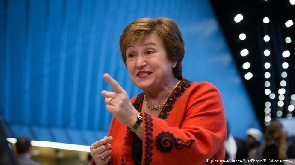 IMF Chief Kristalina Georgieva
IMF Chief Kristalina Georgieva
The International Monetary Fund (IMF) is projecting a further rise in Ghana’s Debt-to-GDP ratio next year by 0.2 per cent to 63.3 per cent of GDP.
This is to be driven partly by exceptional energy and financial sector costs.
The Breton Wood institution is, however, forecasting the Debt-to-GDP ratio to drop to 60.2 per cent by 2024.
The Debt-to-GDP ratio for this year is expected to hit 63.1 per cent of GDP.
Out of this, 31.0 per cent is due to the country’s domestic debt and 32.1 per cent to external debt.
In its latest Executive Board Article IV Consultation with Ghana, the Fund welcomed the progress made by the government in the country’s debt management, but expressed concern about Ghana’s high risk of debt distress, and highlighted the need to strengthen the fiscal rules and phase out off?budget operations.
“In addition, most Directors of the Fund urged the authorities to avoid new collateralised borrowing to help reduce public debt and improve fiscal transparency. Directors emphasised that a more ambitious fiscal stance, based on a comprehensive domestic revenue mobilisation strategy, would help anchor debt dynamics on a clearly declining path, contain financing needs, create buffers for contingent liabilities, and support a stronger external position”, the statement emphasised.
The Directors welcomed the Fund’s capacity development efforts to bolster the government’s fiscal reforms, adding: “A number of Directors suggested the adoption of a formal debt anchor to guide the authorities’ debt sustainability efforts over the medium term.”
According to the November 2018 Monetary Policy Committee Report, the stock of public debt rose to 60.3 per cent of GDP (GHS208.6 billion), at the end of September 2019, compared with 56.8 per cent of GDP (GHS170.8 billion) at the end of September 2018. Of the total debt stock, domestic debt was GHS101.4 billion, of which GHS11.2 billion (3.8 per cent of GDP) represented bonds issued to support the financial sector 4 clean-up, while external debt was GHS107.2 billion, with a share of 51.4 per cent in the total public debt.
The Directors of the Fund also commended the government for the strong macroeconomic performance and laying the foundations for sustained and more inclusive growth.
Against the backdrop of external risks and the upcoming elections, it stressed that important challenges remain, especially entrenching prudent macroeconomic policies, ensuring debt sustainability, and pressing ahead with structural reforms, which are essential to successfully implement the authorities’ “Ghana beyond Aid” agenda and reduce poverty and inequality.
The directors encouraged the government to continue strengthening the anti?corruption framework, in particular by enhancing the capacity of law enforcement and prosecutorial bodies.
They welcomed the government’s collaboration with the Financial Action Task Force (FATF) and the Inter?Governmental Action Group against Money Laundering in West Africa to improve the AML/CFT framework and eventually exit the FATF “grey list.”
Growth
The Fund said the outlook for Ghana remains favourable as growth is expected to increase from 6.3 per cent in 2018 to 7 per cent in 2019.
It is expected to average around 5 per cent over the next few years, supported by new potential oil discoveries and mining.
Inflation
The Breton Wood institution said consumer price inflation has stayed close to the center of the target band in recent months, despite the pass-through from Cedi depreciation and higher utility tariffs, and is expected to decline to around 6 per cent over the medium term.
Inflation, however, inched up to 8.2 per cent in November 2019.
Fiscal deficit
The Fund stated that the 2020 budget is projected to deliver a headline deficit (excluding energy and financial sector costs) of 4.9 per cent of GDP, equivalent to an overall deficit of 6.4 per cent of GDP.
At current policies, it stated that the overall deficit is projected to stabilise over the medium-term to about 5 per cent of GDP.
However, it said “downside risks affecting this baseline forecast include spending pressures in the context of the 2020 election, financing challenges—possibly triggered by tighter global conditions—and larger-than-expected energy and financial sector costs. On the upside, over the medium-term Ghana could benefit from new oil discoveries, higher cocoa prices, rapid diversification driven by the authorities’ industrialisation efforts, and the potential for domestic revenue mobilisation reforms.”
Under Article IV of the IMF's Articles of Agreement, the IMF holds bilateral discussions with members, usually every year. A staff team visits the country, collects economic and financial information, and discusses with officials the country's economic developments and policies.
Upon the team’s return to the headquarters, the staff prepare a report, which forms the basis for discussion by the Executive Board.
At the conclusion of the discussion, the Managing Director, as Chairman of the Board, summarises the views of Executive Directors, and this summary is transmitted to the country's authorities.